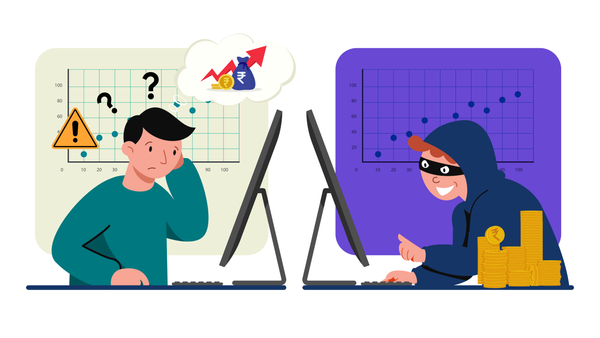Digital Arrest Fraud: Understanding the Threat and Prevention Strategies
Digital Arrest Fraud is a new cyber scam where fraudsters pose as law enforcement, claim victims are involved in crimes, and demand money to "clear" their name from false charges.

What is Digital Arrest Fraud?
Sunita, an engineer working for a well-known multinational company, received an unexpected call one morning from an unknown number claiming to be airport authorities. The caller informed her that a parcel in her name had been found containing drugs. Confused and alarmed, Sunita began to worry. The caller then asked her to join a video call to provide more details for further investigation. Believing the call to be legitimate, Sunita complied.
During the video call, the scammers asked for her personal details, such as her name, address, and bank information, and then instructed her to sit in front of her computer. They falsely claimed that she had been "digitally arrested" and must remain there until police arrived to arrest her in person. As Sunita became increasingly anxious, they offered her a way out, saying her name could be cleared if she paid Rs 10 lakh. Fearing the loss of her job, social status, and respect, Sunita immediately transferred Rs 7 lakh. The scammers assured her that the police would not come and that her name would be cleared from the case.
Sunita had fallen victim to a new kind of cyber fraud known as "Digital Arrest Fraud." In this scheme, fraudsters pose as law enforcement officers and trick victims into believing they are involved in criminal activity. They might impersonate agencies like the CBI or ED, falsely claiming that the victim's bank account, credit card, PAN number, SIM card, or other documents have been linked to a crime. Sometimes, they fabricate stories about a loved one being involved in an accident or crime.
These scammers typically have some information about the victim, making their claims more convincing. Once the victim is convinced, they demand money in exchange for supposedly "clearing" their name. With advancements in technology, these types of cybercrimes, like Digital Arrest Fraud, are becoming more common, with fraudsters continually finding new ways to deceive and exploit their victims.
Understanding the Menace of Digital Arrest Fraud
Digital Arrest Fraud usually starts with careful planning. The scammers gather information about you, which could be stolen through phishing or any other sources. Then, they’ll call you, pretending to be from a law enforcement agency, and claim you’re involved in a crime. They might say your Aadhar card, social security number, or bank account was misused, or they found drugs in a package addressed to you. Once they’ve got you worried, they’ll begin the digital arrest process. This can mean anything from blocking your access to online accounts to threatening you with video surveillance. Recent cases have shown how these cybercriminals use tricky tactics, like pretending to be FBI agents or accusing innocent people of money laundering, to trick and exploit unsuspecting victims.
Why do people fall for Digital Arrest Fraud?
There are multiple practical and psychological reasons behind this.
Lack of Knowledge: A lot of people simply don’t know about this type of scam. In today’s digital world, we’re used to everything being online—so when someone gets a call saying they’ve been “digitally arrested,” it doesn’t seem that far-fetched. They think, “Well, if banking and government services are online, maybe law enforcement is too.”
But the real trap lies in the psychological manipulation.
Fear and Authority: Scammers pretend to be police officers or government agents because they know most of us fear legal trouble. The second someone hears they’re in danger of being arrested, they panic. The scammer’s authoritative tone makes it hard for people to think straight.
Shock and Confusion: Fraudsters throw shocking accusations, like identity theft or being involved in a crime like drug trafficking. This blindsides the victim, triggering fear and confusion, and stopping them from thinking logically. Pre-existing anxieties about finances or legal problems only make things worse.
Desire for Quick Resolution: To escape the situation quickly, the victim is offered an easy solution—usually paying a fine or cooperating with the “investigation.” Under stress, this seems like the easiest way to avoid trouble, so people comply without questioning if it’s legit.
In short, a mix of fear, lack of awareness, and the urge to fix things quickly makes people vulnerable to Digital Arrest Fraud.
Protective Measures Against Digital Arrest Fraud
Cyber awareness and cyber hygiene are the only ways to safeguard against Digital Arrest Fraud and similar cyber threats.
- First of all, there is no such thing as digital arrest. Law enforcement agencies never contact anyone via social media or video calls and collect personal information or money.
- Never share your confidential information like bank account information, Aadhaar card, or social security number with anyone online, even if someone is pretending to be a police officer.
- If someone is threatening you in the name of a digital arrest, don’t respond and report the incident to the authorities.
- Victims of incidents like digital arrest often fall prey due to psychological factors such as fear and urgency. So stay calm and rational if someone is threatening you. Maintain Skepticism and Critical Thinking.
Common Cyber Safety Practices
- Practice Cyber Hygiene: Regularly update passwords, enable two-factor authentication, and ensure software is up-to-date to thwart unauthorized access to accounts and devices.
- Exercise Vigilance Against Phishing Attempts: Refrain from clicking on suspicious links or downloading attachments from unknown sources. Verify the authenticity of emails and messages before divulging personal information.
- Fortify Device Security: Install reputable antivirus and anti-malware solutions, and maintain the latest security patches for operating systems and applications.
- Harness the Power of Virtual Private Networks (VPNs): Encrypt internet connections to bolster privacy and security, but exercise caution when opting for free VPN services.
- Monitor Online Activities: Routinely scrutinize online accounts for signs of unauthorized or unlawful access, and set up alerts for any suspicious activity.
- Ensure Secure Communication Channels: Utilize encryption for sensitive information and refrain from sharing passwords or personal details in public forums.
- Promote Cyber Awareness: Educate yourself and others about prevalent cyber threats, particularly those involving impersonation of law enforcement officials. Collaboration between law enforcement agencies and telecommunication companies can aid in identifying and blocking fraudulent calls.
Conclusion
Digital Arrest Fraud represents a significant cybersecurity threat, exploiting individuals’ anxieties and vulnerabilities for financial gain. By adopting proactive cyber safety measures and remaining vigilant against potential scams, individuals can shield themselves from falling victim to digital arrest and other cyber threats. Netizens must navigate the ever-changing cyber threat landscape with knowledge, awareness, and robust cybersecurity practices. We can combat digital arrest and safeguard our digital identities and assets.
Recent Incidents of Digital Arrest Fraud
Digital Arrest Fraud has happened in different places. In one case in Noida, someone pretending to be a cop tricked a person into giving them over Rs 11 lakh. They made up a story about the person being involved in a fake money-laundering scheme, using fake names to make it seem real. In another case in Faridabad, a 23-year-old was convinced by fake cops that she was part of something illegal and had to pay them money.
Woman in Noida falls prey to digital arrest scam, was forced to pay Rs 3.7 lakh for release





